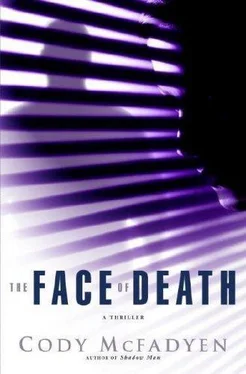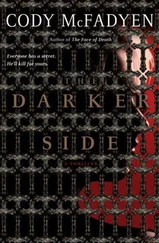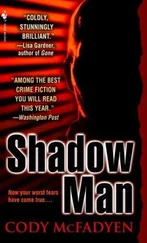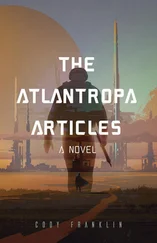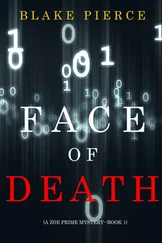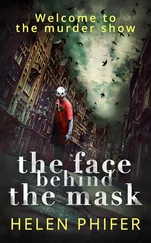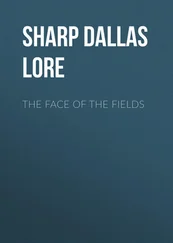"All clear in here," I say into it, my voice steadier than I feel. "Send in a medic for the girl."
10
NIGHT HAS OFFICIALLY FALLEN IN CANOGA PARK. THE HOUSE ISlit up by patrol cars and streetlamps, but SWAT is getting ready to leave and the helicopter has gone. The neighborhood is quiet again, though I can hear the sounds of the city just a few blocks away. Windows are lit up along the street, families are inside, every curtain is drawn. I imagine if I checked them, I'd find every door locked too.
"Good work," Dawes said to me as we watched the EMTs load an unconscious Sarah into the back of an ambulance. They were moving fast; she'd started to turn gray and her teeth were chattering. Signs of shock.
"Thanks."
"I mean it, Agent Barrett. This could have turned out a lot worse."
He pauses. "We had a hostage situation six months ago. A meth-freak dad with a gun. He'd beat up his wife, but what really worried us was the fact that he was waving that gun around with one hand while he cradled his five-month-old daughter in his free arm."
"Bad," I say.
"Real bad. Add to it that he was high, I mean flying. You ever see a meth-freak when they're wigging out? It's a combination of hallucinations and paranoia. Not much for a hostage negotiator to work with."
"So what happened?"
Dawes looks away for a moment, but not before I catch a glimpse of the grief in his eyes.
"He shot the wife. Without warning. He was jabbering away and then he just stopped talking mid-sentence, pointed the gun at her, and . . . blew . . . her . . . away ." He shakes his head. "You could have heard a pin drop in the command van. Suffice to say, it forced our hand."
"If he could shoot the wife without preamble . . ."
Dawes nods. "Then he could do the same with the baby. Our sniper already had a shot lined up, and he got the green light and he took it. It was righteously accurate, dead in the forehead, no fuss, no muss. Perfect." He sighs. "Problem is, Dad dropped the baby girl and she landed on her head and died. That sniper shot himself a week later." His look is more piercing this time. "So, like I said, it could have turned out a lot worse here, Agent Barrett."
"Call me Smoky."
He smiles. "All right, I will. Do you believe in God, Smoky?"
The question startles me. I give him my most honest answer.
"I don't know."
"Yeah. Me neither."
He shakes my hand, gives me a sad smile and a slight nod, and he's gone. His story remains behind, echoing inside me, a tale of impossible choices. Thanks for sharing, Dawes.
I sit down on the curb in front of the house and try to gather myself. Callie and Alan are both on their cell phones. Callie finishes and comes over, plopping down next to me.
"Good news, honey-love. I called Barry Franklin, and he agreed, after much grumbling, to ask for this case. He'll be here shortly."
"Thanks," I say.
Homicides, with some exceptions, are not federal crimes. I'm not allowed to walk into a jurisdiction and take over a murder just because I feel like it. Everything we do involves and requires liaison with the locals to be on the up-and-up. Like most agents (and local cops) I prefer to engineer my "liaison relationships." This is where Barry comes in. Barry is a homicide detective for the LAPD, one of the elite few to reach the rank of Detective First Grade. If he wants a case, it's his.
I met him on the very first case I had as a unit head in Los Angeles. A crazy young man was torching homeless people and taking their feet for trophies. Barry had asked the Bureau to help with a profile. Neither of us had cared about politics or credit. We just wanted to catch the bad guy and we did.
The pragmatic end of things: He's an excellent investigator, he won't deny me access to the crime scene, and if I ask him nicely, he'll utter the magic words, request for assistance. Those words open the door to full and unfettered involvement on our part. Until then, we are legally no more than observers.
"How are you doing, honey-love?" Callie asks.
I rub my face with my hands. "I'm supposed to be on vacation, Callie. The whole thing in there . . ." I shake my head. "It was surreal. And fucked up. The day started out great. Now I feel crappy and . . . yuck. Too many messy cases in a row."
People think every murder is a bad one, and while they're technically right, horror comes in degrees. The gutting of an entire family is a jolt.
"You need a dog," she says.
"I need a good laugh," I reply, forlorn.
"Just one?"
I give her a wry smile. "Nope. I need something on a trend. A series of good laughs. I need to wake up and smile, and then I need to do it again the next day, and again the day after that. Then I can have a shitty day, and it won't feel so bad."
"True," she muses. " 'Into every life a little rain,' and all that--but you've taken it to a new level." She pats my hand. "Get a dog."
I laugh, as she'd intended.
Quantico, Quantico, a voice sings inside my head. No Sarahs, no up close and personal, no clangy-jitters there.
Alan heads toward us, still talking on his cell phone. When he gets to us, he holds the phone away from his ear. "Elaina wants to know the outlook on tonight. As far as Bonnie goes."
I think it through. I need Barry to arrive. I need him to get his Crime Scene Unit onto processing the house. I need to go through the home and soak in the scene.
It isn't officially ours yet, but I'm not willing to just walk away. I sigh.
"It's going to be a late one. Can you ask her if she minds taking Bonnie for the night?"
"No problem."
"Tell Elaina I'll be in touch tomorrow."
He puts the phone to his ear and walks away, delivering the news.
"What about me?" Callie asks.
I give her a tired grin. "You get to work on your vacation, just like me. We're going to meet Barry, check things out . . ." I shrug. "And then we'll see. Maybe it will be back to vacation-time, maybe not."
She sighs, an overdramatic, long-suffering sigh. "Slave driver," she mutters. "I want a raise."
"I want world peace," I reply. "Disappointment abounds. Get used to it."
"Bonnie's covered," Alan says as he returns. "So what's the plan of action here?"
Time to take command.
This is my primary function, above all others. I run a group, really, of luminaries. Everyone has an area they shine in. Callie is a star when it comes to forensics. Alan is a legend in the interrogation room, and he's the best there is when it comes to beating feet and canvassing an area. He's tireless and he misses nothing. You don't get people like that to follow you because they like you. They have to respect you. It requires just a touch of arrogance. You have to be willing to acknowledge your own strengths, to be a star in your own area and know it. Where I excel is in the understanding of those we hunt. In seeing a scene, not just looking at it. Anyone can walk through a murder site and observe a body. All the skill is in the reverse-engineering. Why that body? Why here? What does that say about the killer? Some are skilled at it. Some are very skilled. I'm gifted, and just arrogant enough to acknowledge it. My personal talent in my chosen field is my ability to understand the darkness that makes up the men I hunt.
Lots of people think they understand the mind of serial killers. They read their true-crime books, perhaps they steel themselves and give a series of gory crime photos an unblinking eye. They talk about predators, the psychosexuality of it all, and they feel enlightened. All of that is fine, there's nothing wrong with it--but they miss the boat by a mile.
I tried to explain this once in a lecture. Quantico was doing their version of career day, and various guest speakers were giving command performances to rooms full of bright young trainees. My turn came and I stared out at them, at their youth and hope, and tried to explain what I was talking about.
Читать дальше
